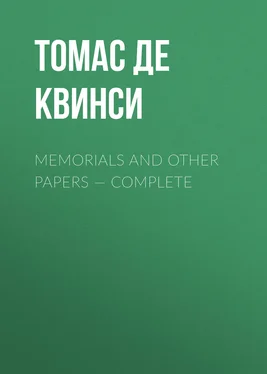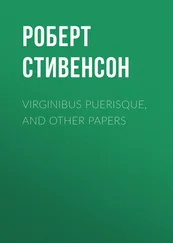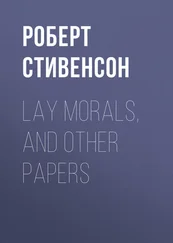Томас Де Квинси - Memorials and Other Papers — Complete
Здесь есть возможность читать онлайн «Томас Де Квинси - Memorials and Other Papers — Complete» — ознакомительный отрывок электронной книги совершенно бесплатно, а после прочтения отрывка купить полную версию. В некоторых случаях можно слушать аудио, скачать через торрент в формате fb2 и присутствует краткое содержание. Жанр: foreign_prose, literature_19, foreign_antique, на английском языке. Описание произведения, (предисловие) а так же отзывы посетителей доступны на портале библиотеки ЛибКат.
- Название:Memorials and Other Papers — Complete
- Автор:
- Жанр:
- Год:неизвестен
- ISBN:нет данных
- Рейтинг книги:5 / 5. Голосов: 1
-
Избранное:Добавить в избранное
- Отзывы:
-
Ваша оценка:
- 100
- 1
- 2
- 3
- 4
- 5
Memorials and Other Papers — Complete: краткое содержание, описание и аннотация
Предлагаем к чтению аннотацию, описание, краткое содержание или предисловие (зависит от того, что написал сам автор книги «Memorials and Other Papers — Complete»). Если вы не нашли необходимую информацию о книге — напишите в комментариях, мы постараемся отыскать её.
Memorials and Other Papers — Complete — читать онлайн ознакомительный отрывок
Ниже представлен текст книги, разбитый по страницам. Система сохранения места последней прочитанной страницы, позволяет с удобством читать онлайн бесплатно книгу «Memorials and Other Papers — Complete», без необходимости каждый раз заново искать на чём Вы остановились. Поставьте закладку, и сможете в любой момент перейти на страницу, на которой закончили чтение.
Интервал:
Закладка:
What might be the quality or the extent of that relief with which Mr. White was able to crown the expectations of poor Mrs. Schreiber, I do not know; but that the relief could not have been imaginary is certain, for he was earnestly invited to repeat his visits, costly as unavoidably they were. Mrs. Schreiber did not reside at Laxton. Tenderly as she loved Lady Carbery, it did not seem consistent with her dignity that she should take a station that might have been grossly misinterpreted; and accordingly she bought or hired a miniature kind of villa, called Tixover , distant about four miles from Laxton. A residence in such a house, so sad and silent at this period of affliction for its mistress, would have offered too cheerless a life to Mr. White. He took up his abode, therefore, at Laxton during his earliest visit; and this happened to coincide with that particular visit of my own during which I was initiating Lady Carbery into the mysteries of New Testament Greek. Already as an infant I had known Mr. White; but now, when daily riding over to Tixover in company, and daily meeting at breakfast and dinner, we became intimate. Greatly I profited by this intimacy; and some part of my pleasure in the Laxton plan of migration to Manchester was drawn from the prospect of renewing it. Such a migration was suggested by Mr. White himself; and fortunately he could suggest it without even the appearance of any mercenary views. His interest lay the other way. The large special retainer, which it was felt but reasonable to pay him under circumstances so peculiar, naturally disturbed Mr. White; whilst the benefits of visits so discontinuous became more and more doubtful. He proposed it, therefore, as a measure of prudence, that Mrs. Schreiber should take up her abode in Manchester. This counsel was adopted; and the entire Laxton party in one week struck their Northamptonshire tents, dived, as it were, into momentary darkness, by a loitering journey of stages, short and few, out of consideration for the invalid, and rose again in the gloomy streets of Manchester.
Gloomy they were at that time—mud below, smoke above—for no torch of improvement had yet explored the ancient habitations of this Lancashire capital. Elsewhere I have expressed the inexhaustible admiration which I cherish for the moral qualities, the unrivalled energy and perseverance, of that native Lancashire population, as yet not much alloyed with Celtic adulteration. My feelings towards them are the same as were eloquently and impressively avowed by the late eminent Dr. Cooke Taylor, after an official inquiry into their situation. But in those days the Manchester people realized the aspiration of the noble Scythian; not the place it was that glorified them , but they that glorified the place. No great city (which technically it then was not, but simply a town or large village) could present so repulsive an exterior as the Manchester of that day. Lodgings of any sort could with difficulty be obtained, and at last only by breaking up the party. The poor suffering lady, with her two friends, Lady Carbery and my mother, hired one house, Lord and Lady Massey another, and two others were occupied by attendants—all the servants, except one lady's-maid, being every night separated by a quarter of a mile from their mistresses. To me, however, all these discomforts were scarcely apparent in the prodigious revolution for the better which was now impressed upon the tenor of my daily life. I lived in the house of the head-master; but every night I had leave to adjourn for four or five hours to the drawing-room of Lady Carbery. Her anxiety about Mrs. Schreiber would not allow of her going abroad into society, unless upon the rarest occasions. And I, on my part, was too happy in her conversation—so bold, so novel, and so earnest—voluntarily to have missed any one hour of it.
Here, by the way, let me mention that on this occasion arose a case of pretended " tuft-hunting ," which I, who stood by a silent observer, could not but feel to involve a malicious calumny. Naturally it happened that coroneted carriages, superb horses, and numerous servants, in a town so unostentatious and homely as the Manchester of that day, drew the public gaze, and effectually advertised the visit of the Laxton ladies. Respect for the motive which had prompted this visit coöperated with admiration for the distinguished personal qualities of Lady Carbery, to draw upon her from several leading families in the town such little services and attentions as pass naturally, under a spontaneous law of courtesy, between those who are at home and those who suffer under the disadvantages of strangership . The Manchester people, who made friendly advances to Lady Carbery, did so, I am persuaded, with no ulterior objects whatsoever of pressing into the circle of an aristocratic person; neither did Lady Carbery herself interpret their attentions in any such ungenerous spirit, but accepted them cordially, as those expressions of disinterested goodness which I am persuaded that in reality they were. Amongst the families that were thus attentive to her, in throwing open for her use various local advantages of baths, libraries, picture-galleries, etc., were the wife and daughters of Mr. White himself. Now, one of these daughters was herself the wife of a baronet, Sir Richard Clayton, who had honorably distinguished himself in literature by translating and improving the work of Tenhove the Dutchman (or Belgian?) upon the house of the De' Medici —a work which Mr. Roscoe considered "the most engaging work that has, perhaps, ever appeared on a subject of literary history." Introduced as Lady Clayton had been amongst the elite of our aristocracy, it could not be supposed that she would be at all solicitous about an introduction to the wife of an Irish nobleman, simply as such, and apart from her personal endowments. Those endowments, it is true,—namely, the beauty and the talents of Lady Carbery, made known in Manchester through Mr. White's report of them, and combined with the knowledge of her generous devotion to her dying friend, secluding her steadily from all society through a period of very many months,—did, and reasonably might, interest many Manchester people on her behalf. In all this there was nothing to be ashamed of; and, judging from what personally I witnessed, this seems to have been the true nature and extent of the "tuft-hunting;" and I have noticed it at all simply because there is a habit almost national growing up amongst us of imputing to each other some mode of unmanly prostration before the aristocracy, but with as little foundation for the charge generally, I believe, as I am satisfied there was in this particular instance.
Mr. White possessed a museum—formed chiefly by himself, and originally, perhaps, directed simply to professional objects, such as would have little chance for engaging the attention of females. But surgeons and speculative physicians, beyond all other classes of intellectual men, cultivate the most enlarged and liberal curiosity; so that Mr. White's museum furnished attractions to an unusually large variety of tastes. I had myself already seen it; and it struck me that Mr. White would be gratified if Lady Carbery would herself ask to see it; which accordingly she did; and thus at once removed the painful feeling that he might be extorting from her an expression of interest in his collection which she did not really feel.
Amongst the objects which gave a scientific interest to the collection, naturally I have forgotten one and all—first, midst, and last; for this is one of the cases in which we all felicitate ourselves upon the art and gift of forgetting; that art which the great Athenian [Footnote: "The great Athenian"—Themistocles.] noticed as amongst the desiderata of human life—that gift which, if in some rare cases it belongs only to the regal prerogatives of the grave, fortunately in many thousands of other cases is accorded by the treachery of a human brain. Heavens! what a curse it were, if every chaos, which is stamped upon the mind by fairs such as that London fair of St. Bartholomew in years long past, or by the records of battles and skirmishes through the monotonous pages of history, or by the catalogues of libraries stretching over a dozen measured miles, could not be erased, but arrayed itself in endless files incapable of obliteration, as often as the eyes of our human memory happened to throw back their gaze in that direction! Heaven be praised, I have forgotten everything; all the earthly trophies of skill or curious research; even the ćrolithes, that might possibly not be earthly, but presents from some superior planet. Nothing survives, except the humanities of the collection; and amongst these, two only I will molest the reader by noticing. One of the two was a mummy; the other was a skeleton . I, that had previously seen the museum, warned Lady Carbery of both; but much it mortified us that only the skeleton was shown. Perhaps the mummy was too closely connected with the personal history of Mr. White for exhibition to strangers; it was that of a lady who had been attended medically for some years by Mr. White, and had owed much alleviation of her sufferings to his inventive skill. She had, therefore, felt herself called upon to memorialize her gratitude by a very large bequest—not less (I have heard) than twenty-five thousand pounds; but with this condition annexed to the gift—that she should be embalmed as perfectly as the resources in that art of London and Paris could accomplish, and that once a year Mr. White, accompanied by two witnesses of credit, should withdraw the veil from her face. The lady was placed in a common English clock-case, having the usual glass face; but a veil of white velvet obscured from all profane eyes the silent features behind. The clock I had myself seen, when a child, and had gazed upon it with inexpressible awe. But, naturally, on my report of the case, the whole of our party were devoured by a curiosity to see the departed fair one. Had Mr. White, indeed, furnished us with the key of the museum, leaving us to our own discretion, but restricting us only (like a cruel Bluebeard) from looking into any ante-room, great is my fear that the perfidious question would have arisen amongst us—what o'clock it was? and all possible ante-rooms would have given way to the just fury of our passions. I submitted to Lady Carbery, as a liberty which might be excused by the torrid extremity of our thirst after knowledge, that she (as our leader) should throw out some angling question moving in the line of our desires; upon which hint Mr. White, if he had any touch of indulgence to human infirmity—unless Mount Caucasus were his mother, and a she-wolf his nurse—would surely relent, and act as his conscience must suggest. But Lady Carbery reminded me of the three Calendars in the "Arabian Nights," and argued that, as the ladies of Bagdad were justified in calling upon a body of porters to kick those gentlemen into the street, being people who had abused the indulgences of hospitality, much more might Mr. White do so with us; for the Calendars were the children of kings (Shahzades), which we were not; and had found their curiosity far more furiously irritated; in fact, Zobeide had no right to trifle with any man's curiosity in that ferocious extent; and a counter right arose, as any chancery of human nature would have ruled, to demand a solution of what had been so maliciously arranged towards an anguish of insupportable temptation. Thus, however, it happened that the mummy, who left such valuable legacies, and founded such bilious fevers of curiosity, was not seen by us; nor even the miserable clock-case.
Читать дальшеИнтервал:
Закладка:
Похожие книги на «Memorials and Other Papers — Complete»
Представляем Вашему вниманию похожие книги на «Memorials and Other Papers — Complete» списком для выбора. Мы отобрали схожую по названию и смыслу литературу в надежде предоставить читателям больше вариантов отыскать новые, интересные, ещё непрочитанные произведения.
Обсуждение, отзывы о книге «Memorials and Other Papers — Complete» и просто собственные мнения читателей. Оставьте ваши комментарии, напишите, что Вы думаете о произведении, его смысле или главных героях. Укажите что конкретно понравилось, а что нет, и почему Вы так считаете.












